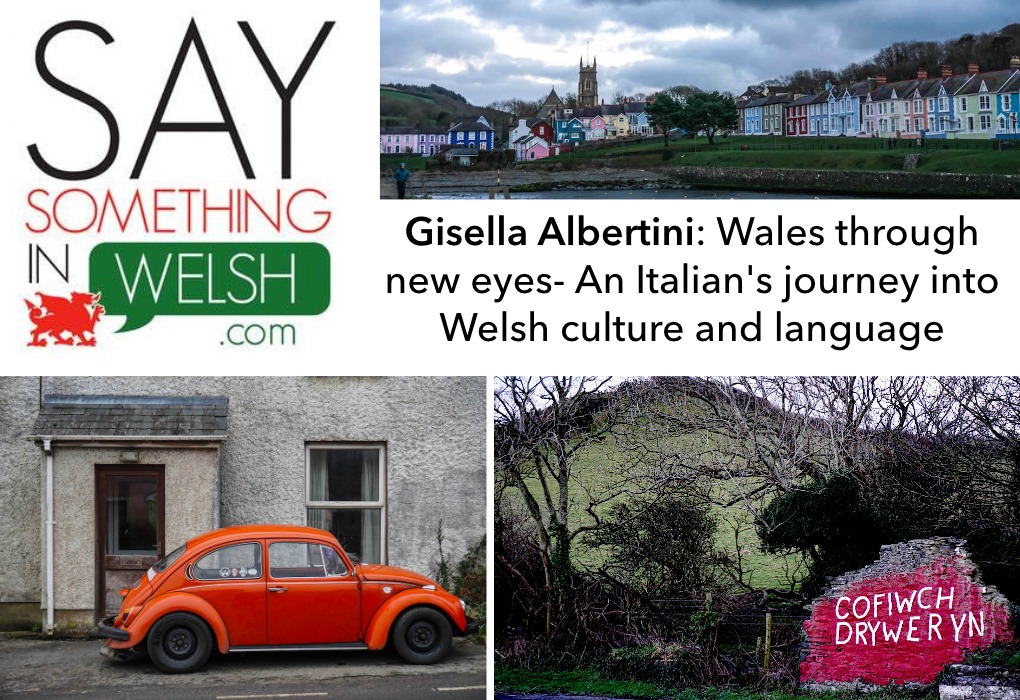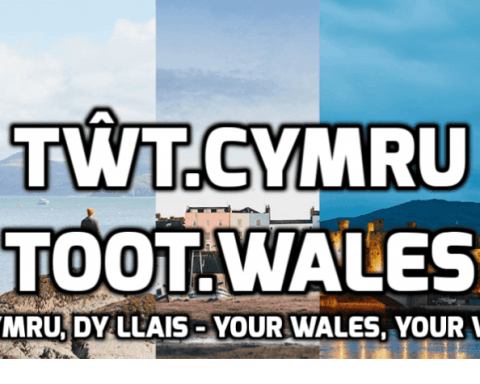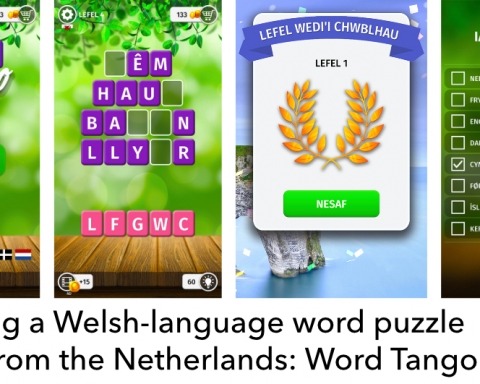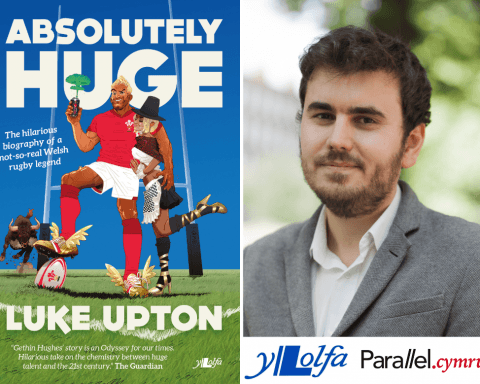Gisella has been learning Welsh with Say Something In Welsh for a short period all the way in Turin, and after being captivated by our language and Welsh rock bands she decided to take a trip here and see what Cymru really looks like. Here she shares with the world her experiences, thoughts and photos on our country and music...
On a summer day with not much to do, I decided to give a try to one SaySomethingInWelsh.com lesson. Fast forward to six months later, I’m wandering around Wales and realise that…I’m actually able to communicate with people in Welsh. How could this happen? The first time I came to the UK, I had studied English for seven years at school, but could understand or say almost nothing.
Besides that, nobody was surprised to see students from all over the world coming to learn their language. In Wales, they are! And it’s great to see people’s reaction when I say I’m from Italy and ask:
“Is it ok if I try to speak Welsh with you?”
[astonished face #1, like “Oh wow, an Italian learning our language? Really?”]
“Sure, it’s fine! Do you live here?”
“No, no. It’s just I liked the way it sounds and the songs of a band called Datblygu, so I decided to learn it”
[astonished face #2, like “You must be a little crazy, but that’s ok anyway”]
At this point, I…well…have to say something in Welsh, right? Amazingly enough, they usually understand me. And they answer saying something that I usually pretty much understand, too.
“Da iawn! How long have you been learning?”
“Six months.”
[astonished face #3, like “Months? How come my cousin has been studying it for years, but hasn’t even tried to speak Welsh outside the classroom once?”]
People often thank me as if it were some kind of favour or even sacrifice I’m doing. But the truth is I’m just enoying myself! Hard to believe? Let’s see if my tour diary from February 2019 can prove it.
- Day 1: Abertawe
- Day 2: Aberteifi & Caerfyrddin
- Day 3: The Clonc-edigion, Tregaron & Aberystwyth
- Day 4: Developing a Music Project
- Day 5: Voices of Welsh Language
- Day 6, Epilogue: A final exam (sort of)
Day 1: Abertawe
At Swansea Bus Station
Just hopped off the coach from Stansted Airport, I walk in to ask for information. I wonder if the guy speaks Welsh. Maybe, maybe not. I think “Well I’ve just arrived. I’m too tired. I need to be sure I understand what he says. I’ll use English, this time. Just this time.”
I ask where I can catch the bus to Carmarthen. He doesn’t understand Carmarthen. I try to pronounce it in a few different ways, until he goes “Ooh, Carmarthen! Yes, in 15 minutes, at Stop X”. I wait at the stop for a while, then ask the driver, to be sure. Turns out that’s a local line, I should go to Stop S instead.
Luckily, the right bus is still there. Now I got a bit too anxious to remember to speak Welsh. I ask for a ticket to Carmarthen; he asks “Carmarthen?” (I suppose, again, with a subtle difference in pronunciation that I cannot perceive). I get my ticket and off we go.
I should really memorise Caerfyrddin, though: names in Welsh seem very complicated when you first see them. But once you figure out the alphabet, it’s easy because there’s only one way to pronounce each letter or combination of letters - like Italian and unlike English!
Anyway, since I crossed the England-Wales border, all the road signs are blilingual. Occasionally, on shops and houses, even in Welsh-only. So I can entertain myself reading them and learning something.
“Safle bysiau”
“Edrychwch i’r chwith”
“Dim baeddu”
“Anaddas i gerbyd hir”
“Mae ysmygu yn y fangre hon yn erbyn y gyfraith”
“Mynedfa”
The latter in particular seems very common and related to a lot of incredibly different activities. Until…uhm…got it now, it’s because it means “Entrance”. D’oh!
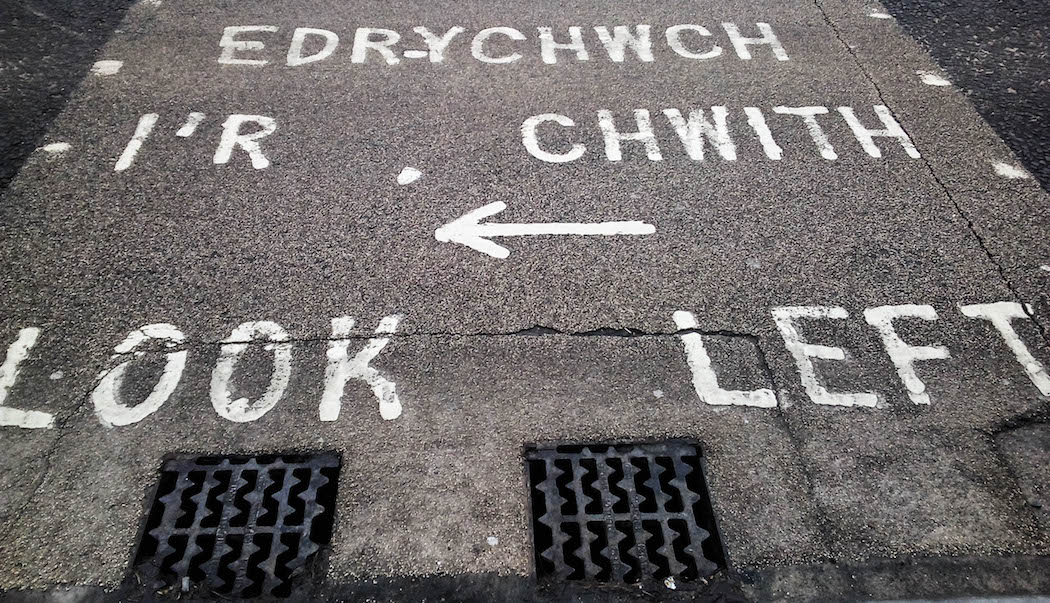
Carmarthen and The Warren
On the bus, nobody is chatting in Welsh. I reach Carmarthen… naaa, Caerfyrddin, Caerfyrddin!...and I have time for a coffee before getting on the bus to Pencader. I remember hearing on S4C the story of a cafe-restaurant that had launched a successful crowdfunding campaign and opened over here. It seemed really neat, guaranteed Welsh-speaking, and close enough, so I head for The Warren.
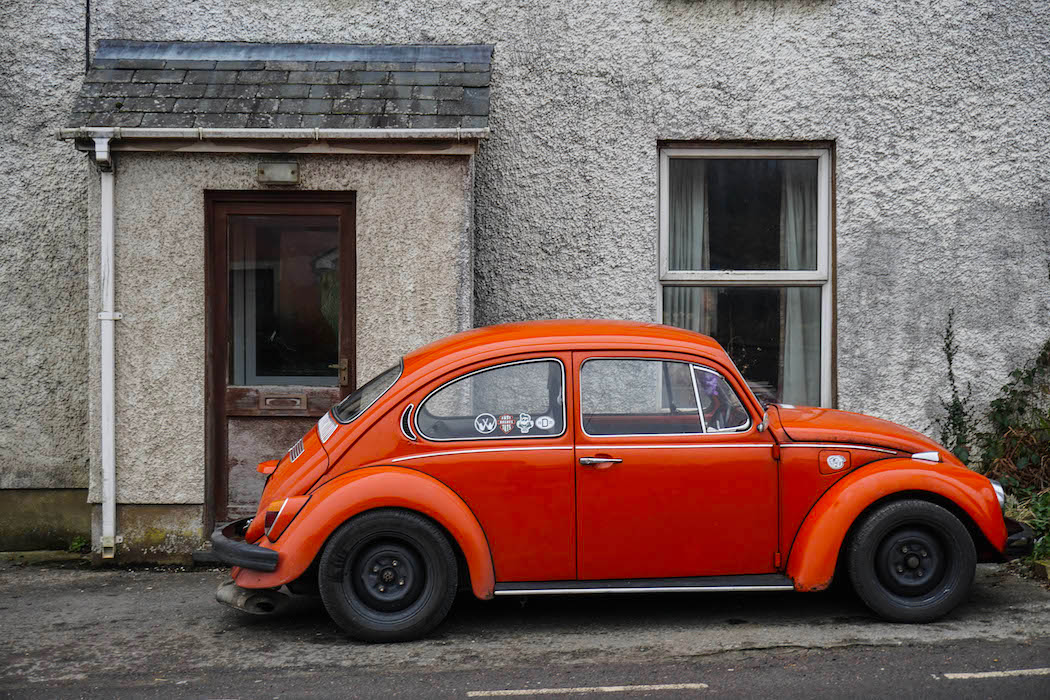 Car y Pobl (Volkswagen) ym Mhencader
Car y Pobl (Volkswagen) ym Mhencader
When it’s time to order…oh, damn…I chicken out again and speak English. Right before going out, at least, I ask if they all speak Welsh: yes, although two of them self-declare as still learning and point at the third as the only fluent speaker. Now, I’d love to say I’m a learner myself and stop for a chat, but unfortunately now it’s too late: I just can’t miss the bus. Well, next time. Loved the coffee and the scone, though!
Reaching Llandysul
On the bus, still nobody chatting in Welsh. At the next stop, a guy wearing a fleece jacket completely covered in cat hair - just like my grandma used to have! - sits next to me and starts talking about the weather. We’re in Britain after all, aren’t we? I don’t understand his question in English and say “Sorry?”. He asks me if I’m Polish (?). I reach Pencader, get off the bus, have a short walk, catch Bwcabus to Llandysul. Reminder: local buses accept cash only; go to the ATM machine first and/or make sure to have pounds and not euros in the wallet, to avoid complications and/or embarrassment.
Dee and Cymraeg
At the bus station I finally meet Dee in person. I had started planning this trip in August, soon after starting SSiW, and had asked for tips on the Forum. One of the first to answer was Dee, who grew up New Zealand, worked in Australia, then moved to Wales. Now she runs Nyth y Kiwi Airbnb, is part of SaySomethinginWelsh staff and is my host for the next few days. It has started snowing a little, but I’m really glad to walk a bit after sitting in planes, coaches and buses for so long. She already knows that the main purpose of my trip is practicing Welsh. So, no more excuses, from now on the official language is going to be Cymraeg. I have to admit that the image of an Italian and a Kiwi chatting in Welsh while walking in the snow in a small town in Wales seems slightly bizarre. But who cares? For the rest of the evening I’ll do my best to communicate, putting together sentences with my limited vocabulary and asking Dee (so patient, poor her!) for the missing words. I’m exhausted and happy to fall asleep in such a cozy and quiet home. Very busy schedule ahead, tomorrow.
I have to admit that the image of an Italian and a Kiwi chatting in Welsh while walking in the snow in a small town in Wales seems slightly bizarre...
Day 2: Aberteifi & Caerfyrddin
Going to Aberteifi
Yesterday we were a bit worried about the weather forecast: snow and ice everywhere, at least for a couple more days. Luckily, this morning, it’s not too bad. Dee and I, with her made-in-Italy car, reach Aberteifi alright.
I’m still a bit confused about so many aber, llan and caer all over the place in Wales. But calling a town like a garment sounds strange and I decided to ban Cardigan, with all the Earls and Marquesses who come along with it: Aberteifi’s the only name I’m going to use. Period.
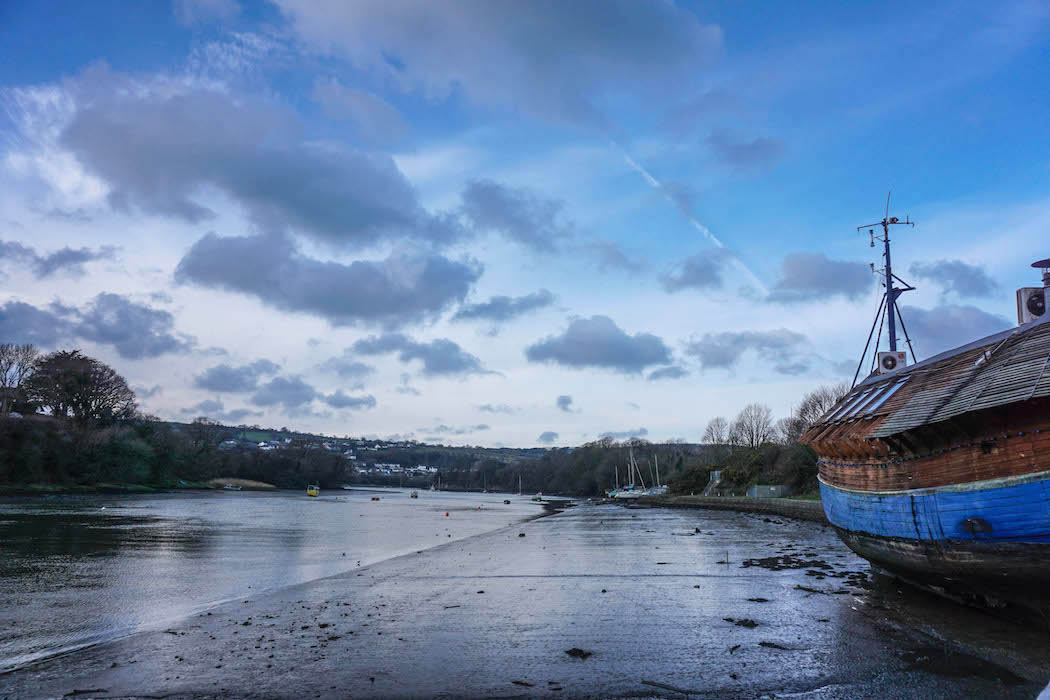 Aberteifi
Aberteifi
Gorffwysfa’r Pysgotwyr - Grŵp Sgwrs
We came here for the weekly conversation group, found on Pethe Clych Teifi. I’ve never been to a Welsh language learners meet-up before. Actually, I‘ve never been to any language learners meet-up before, also because my mind always imagined it as something between a school lesson and an Alchoholic Anonymous group. Not too appealing, I would say.
But I’m here to learn, and I’m going to try and see how it goes. Hey, the location looks nice! I’m even more inspired to start, and I’m also glad that Dee came with me so it’s not a complete jump into the unknown. But I’m a still bit nervous. We’re a few minutes early and there’s a freezing cold wind outside; we walk in the Fisherman’s Rest, we are welcomed by one of the participants and wait for the others to arrive.
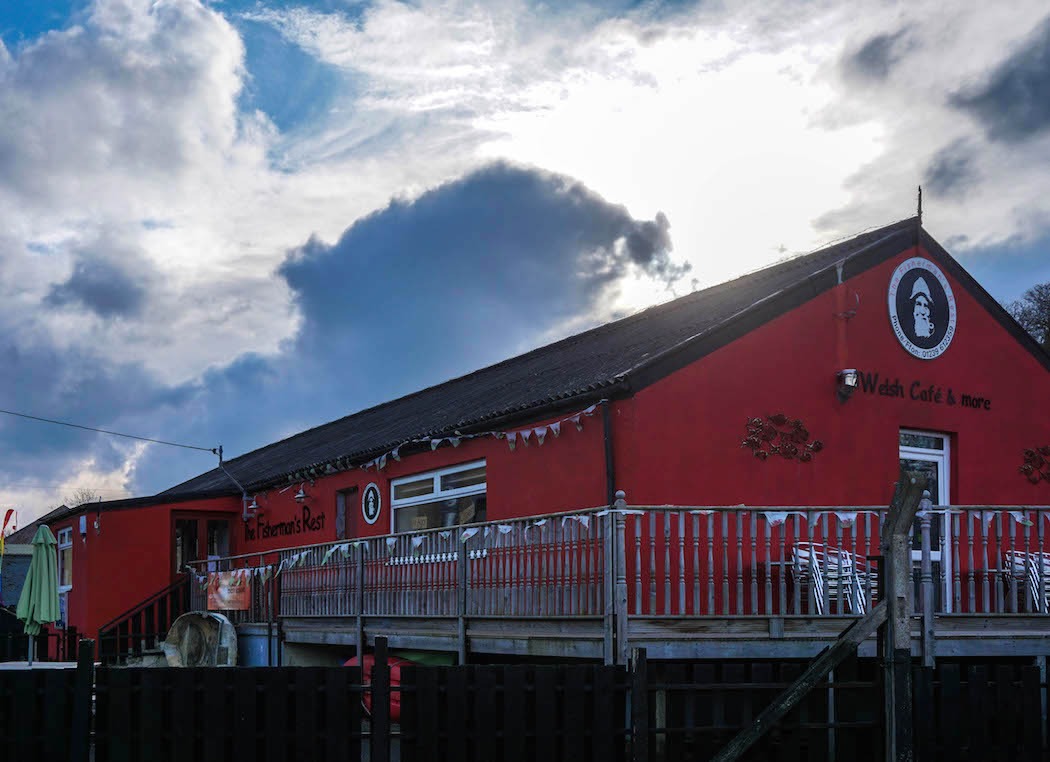 The Fisherman's Rest
The Fisherman's Rest
It’s way simpler and more informal than I thought: fluent speakers and learners sit at a table together; you introduce yourself to those sitting next to you, like at a dinner; you talk or just listen, as you prefer; you can go get a cup of coffee or tea if you feel like, then come back and chat some more. No pressure to do or not to do anything. The few times I had tried to speak outside in the wild, I tended to just say I’m from Italy, then dish out two or three classics from SaySomethinginWelsh early lessons - like Dw wedi bod yn dysgu Cymraeg am bump mis or Mae dal eisiau i fi ymarfer. Then shut up, hope to understand what they’d tell me and soon switch back to English.
In the group, the atmosphere is relaxed and friendly, it feels safe to try and have a conversation: I soon find myself saying things that are way too complicated for my level. It’s amazing to see everybody’s sincere effort to make sense of my garbled sentences, without even a hint of annoyance. So sweet, I’m really grateful, everyone!
Here’s a few of the things I learnt today:
- The totally Italian-sounding bolgi for glutton (from Howard’s vocabulary of the day)
- The hilarious Wyt ti’n Rigoletto? So I will always remember how to ask if someone’s fluent
- The curious and timely Mae’n ddigon oer i sythu brain
Dee has to leave to get work done I’m staying for lunch and to have a look around. Before saying goodbye, I get plenty of tips: I discover where to find a fellow SSiWer* who’d be happy to practice or someone with an Italian mom to speak Italian; where to see interesting gigs and events if I come back later in the week (The Cellar, by the way); and of course, how to go back to Caerfyrddin. Vanya even walks with me to the bus stop. What can I say, I’m all set!
Around Aberteifi
I had planned to look for records and maybe books, but I don’t feel like dragging stuff around all day.
I had planned to go around and try to speak and listen more because the local accent is the first I heard, it’s in my favourite songs, and my favourite singer’s accent - therefore also my favourite accent! In a roundabout way, this town is responsible for me starting to learn Welsh. Should I hate it or love it for this? Well, it’s a nice day, I feel good, I’m enjoying myself and I wouldn’t be here if it wasn’t for Welsh language. So alright then: thanks, Aberteifi!
But now my brain is tired and I’m hungry. Someone suggested Crwst. Very nice place. It’s also a bakery, and bread looks great. There’s a long queue behind me, so it doesn’t seem the right moment to order in Welsh - even though, I don’t remember why, I find myself saying I’m from Italy and learning it. The girl at the counter looks very surprised and happy to hear that. I eat rarebit and buy a tin of bara lawr - unfortunately later confiscated by Stansted officers, as a potentially dangerous item. Annoying but also pretty funny: “Airport security threats: the laverbread”. “The attack of the killer Bara Lawr”. Oh sorry, what was I saying? Right, the Crwst. I get out and have a short walk around. What else? The Welsh-Italian won’t be at the bar/club until later and the fellow SSiWer seems to feel a bit rusty and not quite in the mood for practicing Welsh - it happens, I know, I know - but I have a fun chat with two other people sitting there. Until it’s time to go and catch the bus.
Around Caerfyrddin (and Maridunum)
For today, I had planned not one, two language meet-ups: Aberteifi in the morning, Caerfyrddin in the evening. Dee had suggested to contact Margaret for all details and updates about Carmarthen conversation groups, so I did. It definitely was a good idea, cause she offered a lot of extra help for my trip and also a guided tour of the town. In Welsh, of course, since she knows I’m here to practice.
After meeting at the bus station, the first thing we come across is a bronze plaque outside the town’s Guildhall: I had noticed it before, but couldn’t guess who that affable guy (with outstanding sideburns!), waving to a crowd could be. He’s Gwynfor Evans, first ever Plaid Cymru Member of Parliament. By the way, it was his threat of a hunger strike to force the Conservative Government to honour its commitment to provide a Welsh-language TV (S4C). Chwarae teg for bending the Iron Lady!
We proceed to visit St. Peter’s Church, Merlin’s Oak and the old railway sites, the big fish sculpture (a curious oddity that reminds me of the whale in Pinocchio - but with fins) and of course the Roman amphitheatre. Well, I have to admit that Roman sites in Britain always need a bit of imagination for us Italians to see what we’re supposed to see. Ruins in Italy are more…self-evident, shall we say? However, I’m amazed to find out that I accidentally ended up in one of the most important towns of Britannia and I’m curious to learn more about Rhufeiniaid yng Nghaerfyrddin - even though it’s kinda hard to pronounce it right.

But hey, now thinking back to all the things we’ve been talking about…did I really understand all that stuff in Welsh? I swear I can’t remember which language we used. Let me ask Margaret. Yes, she says we did use Welsh most of the time!
It’s amazing how much more I’m able to understand speaking with people in person, rather than listening to the radio or any recorded material or watching TV. I guess nonverbal communication counts. But probably, it’s mostly that I’m aware that I’m going to have to give some sort of feedback, and it would be embarrassing to admit I have no idea of what they’ve just said. That extra pressure forces me to be way more alert and focused and do my best to understand. And it works!
Roaming for food (and drinks)
Dee joins us for tea and we go to West End Fish and Chips. No, wait: Pysgod a Sglodion. Just sounds so much better, in Welsh. No competition.
We have a look at the menu. What’s the difference between 'one battered cod”'and regular fried cod? - I ask.
Well, that’s actually 'unbattered cod' not 'un battered cod' - they tell me. Ooops!
I order the small portion, and it’s huge. We wonder who’d be able to eat the jumbo. It takes quite some time to finish it, so we can discuss the photo on the wall: two elephants taking a dip in the sea, and the caption Mixed bathing in Aberystwyth. How come there were elephants in Aberystwyth? Who took them to the beach? Does mixed refer to male and female elephants, women and men, or pachyderms and humans? All questions still unanswered, when we head for the Ivy Bush Hotel for the meet-up.
The lounge is warm and comfortable. Let’s get a beer, before sinking in a Chesterfield sofa and Cymraeg. “Beer or lager?” the lady asks. But…isn’t lager a beer? I’d better choose something more traditionally British. I usually prefer buying local anyway, so…Welsh Ale, maybe? A few older ladies, dressed up for some joyous celebration, are chatting in Welsh next to us. They order and leave the bar with a bottle of wine in a large bucket of ice. One bottle and a bucket each. The procession of the matronae gyda’r gwin: a mysterious cult of Bacchus survived from Maridunum times? That was weird.
Caerfyrddin - Grŵp Sgwrs (and some rugby)
Accidentally, there’s also going to be the Six Nations opening match, tonight: Ffrainc - Cymru. Oh well, I guess we can’t expect a crowd at the meet-up. In fact it’s a very small group, but probably even better for me, because my brain’s starting to feel tired, after 24 hours mostly in Welsh. The atmosphere couldn’t be more relaxed, it feels like a group of friends, out for a chat and a drink on a Friday evening. Margaret can actually speak fluently and embroider town names on a map of Wales at the same time. Instead, it still takes me a huge effort to put together some sort of sentences. But I keep on trying, sometimes mixing in English words to fill the gaps, sometimes just sticking to the vocabulary I’ve learnt so far. As long as they answer me, I guess it’s working fine…and it’s great!
Bill is a very dedicated and generous learner, because he’s at the meet-up even though it’s clear he did care about the match. There’s a TV in the room, so Bill, Dee and I have the chance to take a sneaky peek at the highlights, while we talk. I have to confess: I had never-ever seen a match before. I don’t completely understand what’s going on, but it all seems more fun in the home of rugby than in Italy, that’s for sure. When we leave, France is winning. Going back to Llandysul, Dee tunes on Radio Cymru, to hear the updates. I can guess from the tone of the speaker’s voice that something exciting’s happening in the last few minutes…tshhhfffshh…although it’shhhhshshsh…acffssshh-chrsh…mh…bzzzz….oh bloody hell!..tsshhstshhh…whatever, but yes, Wales won. That’s good cause since I’m here, and people are so nice, I’m going to cheer for Wales. And thanks for another lovely day, everybody!
Day 3: The Clonc-edigion, Tregaron & Aberystwyth
The Clonc-edigion
In early January, Nicky had announced:
Saturday 2nd February 11:00 a.m. - The Riverbank Cafe, Tregaron
The Official 13 month anniversary of “Clonc-edigion”
(Because yearly birthday parties are over-rated)
What is a Clonc-edigion? You can read all about it, and find where and when the next is going to happen on SSiW Forum, where it all started. But to give you an idea, here how Nicky Roberts himself had described it, when he launched it on SSiW Forum:
“Clonc-edigion is a group of friendly Welsh speakers of all abilities (from total beginners to fluent speakers) that meet monthly to make new friends, share stories, practice Welsh out and get out there and experience what Ceredigion and the surrounding areas has to offer.”
Today, still snow and ice on the roads, and the Riverside Cafe closed due to weather doesn’t sound like a promising start. But participants from Ceridigion, nearby counties and faraway lands are determined to overcome adversity. Luckily for us, there’s another suitable location, in Tregaron: a broadcast of warning messages allow us to meet at 11 at Cafe Hafan.
Dee is giving a lift to Ingrid and me. Quite a peculiar lot, in this car, now that I think about it: one German, one Italian and one infiltrate from the Pacific Ocean area driving them to a remote location in Wales, while the Government is busy sorting out the Brexit mess. In other times, it would have been enough to raise suspicion, I guess. What’s really going to be discussed at this Clonc-Ewrop-edigion?
But of course, how to get Welsh language to conquer the world!
Most participants had met in person before. And the few of us who are new, and from different countries, have talked before on SSiW Forum. So now it’s a bit as if we all knew one another already. Magic of the Internet, when used wisely.
Languages
Cymraeg is the magnet that attracted us all here, and obviously the one and only official language in the group and with the staff - who are happy to speak Welsh with us. However we all know we can use a little bit of English, if we need to.
But what if we had no other language to fall back to? All of a sudden, I remember my first time in England, when our group of Italian students got off the coach and each one left with their host family. Mine, really nice and welcoming, and with a Brummie-Geordie mix of accents. Goodbye Received Pronunciation, Queen’s English and school practice, hello real world! And no matter what accent, English was the only common language - well, sort of - so I had no choice but try and understand as much as I could and just try and say things. The first days were embarrassing and exhausting, but I remember I had a great time and when I came back, I was able to have a conversation in a foreign language. In Wales, unfortunately, it’s easier to get lazy and find excuses.
In this International clonc, a few guest idioms are exceptionally used: German, Italian and also the lesser-known Beaufortese and Datblyguan. What? You’ve never heard of them? The first appeared in the Forum when Huw named Carini’s as the best Italian Ice Cream in the world (and childhood favourite). I got curious and found a video featuring Marco Carini - son of Giacomo “Jake” Carini, who had come from Italy with his brothers in search of work in the early 20th century, opened a cafe and started making ice cream in Beaufort. Mister Carini speaks English with an awesome accent, that I had never heard before. Huw identified it as authentic Ebbw Vale (later renamed Beaufortese) and promised he’d speak some at the clonc for me. As for Datblyguan, I will explain shortly.
Topics
Sgwrs tend to wander through a variety of subjects. As Bronwen summed up: “Well, that was fun! Topics included the anomalous expansion of water, a helpful Radio Cymru tip on cleaning your toilet brush and a lively debate on the best decade for British music (the 60s, obvs). We only mentioned the B word (Birthday) briefly, in order to wish everyone Penblywdd Hapus for Cloncedigion’s 1st birthday. And to remember our Founding Father - sorry you couldn’t be with us, Nicky.”
Debates may continue on the Forum:
[Isata]: I think you must have blacked out for a moment when we voted, Bronwen. It was definitely the 70s.
[Ingrid]: Def agree with you Isata!
While the Eastern section of the table was discussing the anomalous expansion of water (if I’m not wrong, started by Helen), the Western side seemed to lean towards more trivial matters, like music:
[Isata]: I’ve discovered that I did know at least one track by Datblygu, which they play on Radio Cymru a lot. Now, thanks to Macky and Gisella, I’ve discovered a few more, including the one that Gisella is fluent in. I like this band!
[Macky]: “Hollol hollol hollol…ddiddorol. Amazing story and reason for learning Welsh from Gisella. Has to be one of best learning stories I’ve heard thus far”.
Datblyguan
At school, trying to remember poems by rote in Italian was a nightmare - even though I was equipped with fresh neurons and synapses.
Since I started learning Welsh because I liked how it sounded in a few songs, I thought reading lyrics along might be an enjoyable way to learn to pronounce words right. After a while I just ended up remembering them, without even meaning to! One in particular is basically spoken and I’m able to tell it like a story - as it actually is - effortlessly and smoothly.
Since I started learning Welsh because I liked how it sounded in a few songs, I thought reading lyrics along might be an enjoyable way to learn to pronounce words right.
I did so at the Clonc, and my giggling audience said that if someone asks me what languages I’m fluent in, I should answer: “Italian, English, French and Datblygu”. I will, but to avoid confusion I’m going to call it Datblyguan. So remember: call Huw for Beaufortese, me for Datblyguan.
Tourist in Ceredigion and Sir Gâr
We had reached Tregaron early and walked around a bit before the Clonc-edigion. I like that in Wales it’s easier to find silence. Italy is a beautiful country but unbelievably noisy: cars roaring everywhere, endless roadworks, loud horrible music popping up in every corner, cell phones ringing, people speaking way louder than necessary all the time. It’s very rare to find such quiet places. Also, I had never seen birds of prey hovering slowly above me, like here. They’re so close I can see how they move their tail to change direction. Dee tells us they’re - quite appropriately I must say - called kites. I’m charmed, and glad I’m not a mouse.
Sightseeings are not my priority in this trip, but I enjoy being a simple tourist from time to time. And I’m so lucky to have a special tour guide, driving around to visit places and showing me around: Dee. I couldn’t ask for more!
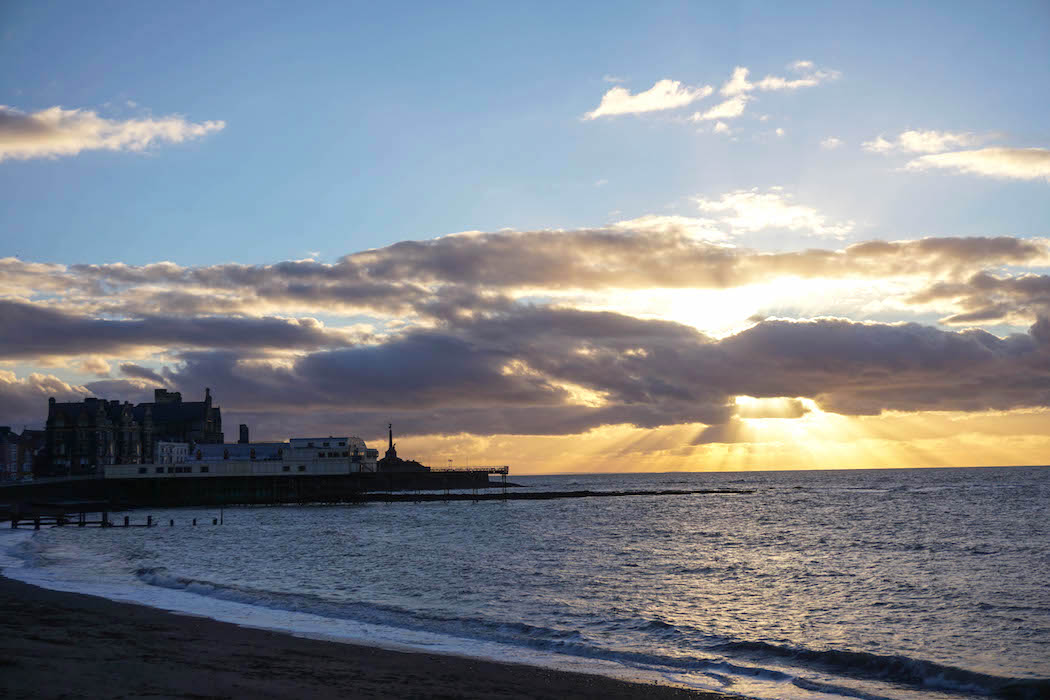 Aberystwyth Bay
Aberystwyth Bay
First stop, Aberystwyth. The other day, while speculating on the bathing elephants*, Dee and Margaret had mentioned this town for being a popular Victorian era destination. We walk on the promenade and see the beach where the elephants were pictured. For a full posh-Victorian-ladies-on-holiday experience we should go up the hill on the funicular railway to enjoy the view of the bay and the Camera Obscura. But there’s not time for everything today, so we go straight to the Siop Y Pethe: I have a look around - it has an interesting selection of books and Wales/Welsh themed objects and gifts - but the main reason we’re here now is Dee and I are meeting Lara and Nicky. A lively and fun conversation starts right away, and I’d love to participate more, but my brain seem to have forgotten how to speak any language. It just left a note: “If you really need to speak, say this: Where can I drink a good beer in Aber?”. Nicky happens to have an answer: Yr Hen Lew Du. (Gosh, written Welsh still puzzling me. Now I see it, how come it looks like the name of a Chinese restaurant?! But naa, it doesn’t if you say it, and by the way it’s an old black lion and a traditional pub that we’re talking about.)
While walking, I get distracted by a cafe named Agnelli’s. Being from Torino I can’t help but thinking of FIAT founder and dynasty with the same name right away. Then I notice they have a wide selection of Italian food and drinks. Not those with Italian names, like Celentano frozen pasta or Gino Ginelli ice cream, but which really exist only abroad. The kind we really have in Italy. A good sign. We decide to go in for a coffee, and maybe speak a little Italian, for a change? On the blackboard, I see today’s special: Hot Bicerin from Turin. Well, now I have to try it! I also have a little chat with Chiara, the owner, who came here to study at the University, loved the atmosphere (oh, no wonder, I understand) and decided to stay. She opened the cafe, and seems to be doing great! By the way, her version of the bicerin is different than the traditional you’d get in Turin. But just like a cover of a song may be even better than the original, this is very good and definitely wins my Torinese seal of approval.
I find out that Aber was the set of “Y Gwyll”. I’ve seen it, I’ve seen it! As far as I know, it’s the only Welsh TV series ever reaching our country. Not in Welsh language, though: via Netflix in the English version called “Hinterland” first, and later, I read, dubbed in Italian for a TV channel. The entry on Italian Wiki defines Aberystwyth as…er…uhm…“small country village”. To be honest, we don’t know much about Wales, in Italy. But it’s because it rarely gets mentioned all by itself, except for ancient history, the Prince, the fabric with the same name and sports. That’s a shame. I know. Anyway, I remember we all thought the locations in the series looked great. Now I know where they are, I can add them to my list for next trip.
While we leave Aber, Dee tells me the story of Capel Celyn, the village where people were forced to leave everything behind and the valley flooded to create a reservoir for Liverpool. The Cofiwch Dryweryn mural, by the A487 near Llanrhystud, stands as a reminder. We stop, and I take a picture. Crazy as it may sound, someone later that very same night would go and write "Elvis" on it. So my photo ends up showing how the wall looked like, just a few hours before being vandalised (and then promptly restored by a group of cool volunteers the day after).

Further south, we reach Aberaeron. It’s a veeeery pretty town, with gracious houses painted in different colors. Dee had planned a quick visit here and then a drive along the coast, so I’d be able to see the scenic route.
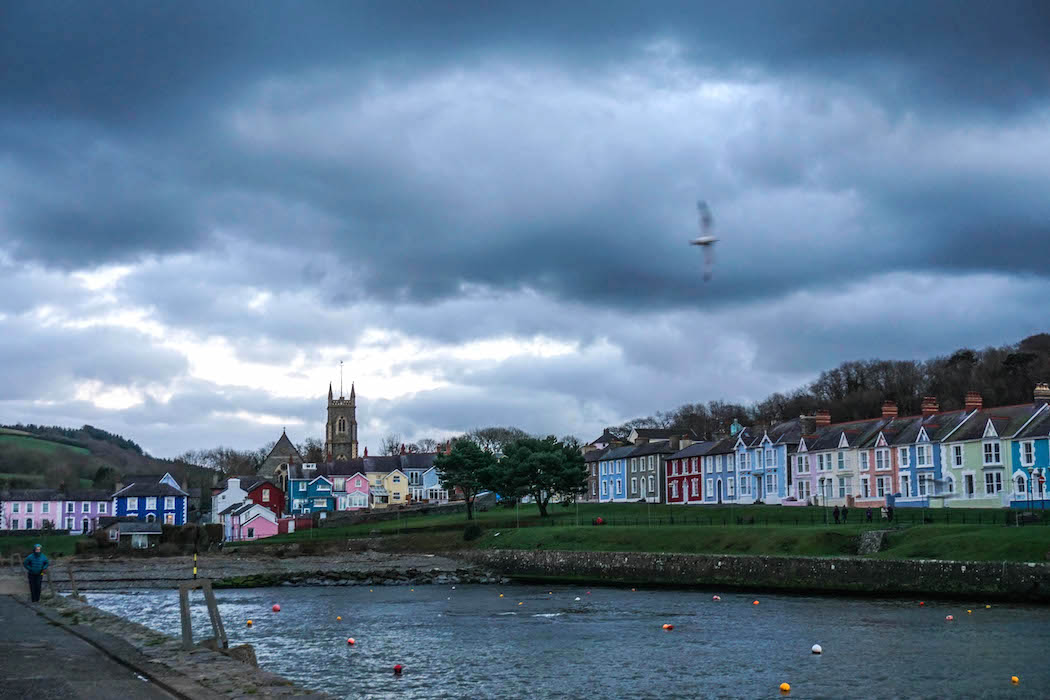 Aberaeron
Aberaeron
However, for lunch I had just cawl moron a sinsir (ok, this name still make me chuckle a bit) and a piece of someone else’s cheese and bread (with their permission, I swear!). It was all good, but now I’m quite hungry. And I haven’t had the chance to drink the beer I was longing for, yet. We walk by the Harbourmaster restaurant. It looks scarily out-of-my-range-fancy, but a sneak peek at the menu outside reveals that it’s very tempting and also surprisigly affordable, especially after noticing that in other restaurants prices are higher than the average anyway - as in nice tourist destinations often happens. Hey, I’m Italian and food is among my top priorities: when I travel, I’d rather sleep on a carpet with a sleeping bag, than give up on good food. We walk in aaand…attention, ladies and gentlemen, drum rolls and trumpets…for the first time ever, walking into a place someone speaks to me in Welsh first! Even just for this, I think they deserve us staying for dinner, don’t they? And definitely a toast. So I’ll start with a (Welsh) beer right away. Yes, I would usually drink wine in these circumstances. But listen, in Northern Europe wine is expensive, I like good beer, and it can be just as fine also with a more refined cuisine like this, so why not? By the time we head back to Llandysul, it’s too dark to see anything on the scenic route, but the food was delicious and well worth the stop. Ceredigion coast, on my list for next time in Wales.
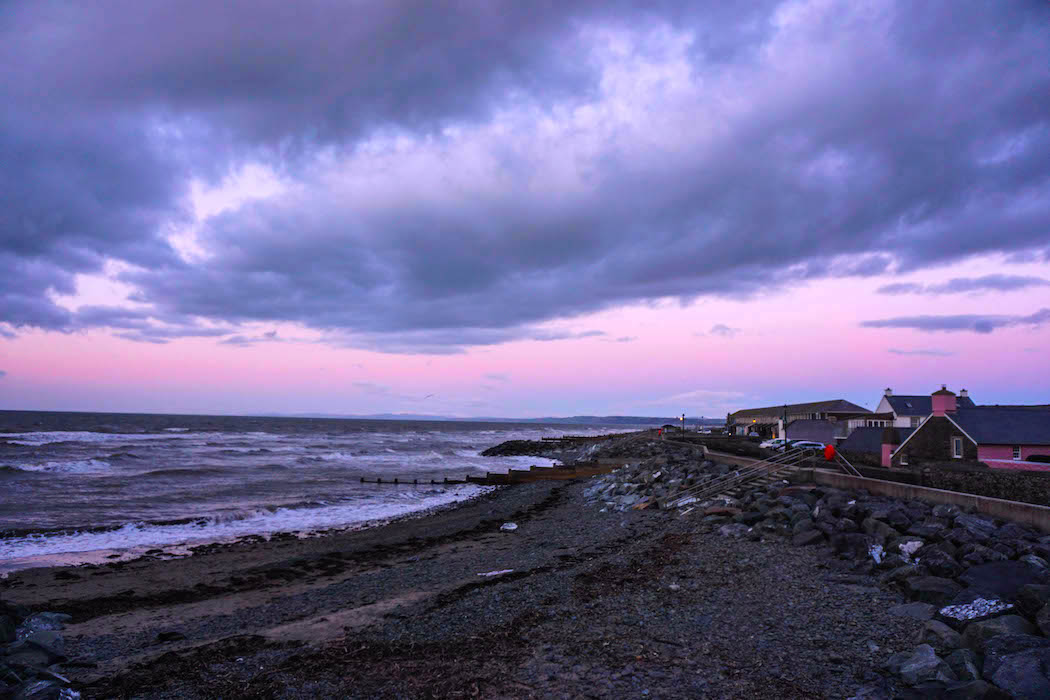 Ceredigion coast
Ceredigion coast
Two days later, I’ll play the tourist again, although with a few obstacles on the way: the National Wool Museum of Felindre is closed on Sunday and Monday in winter, so we can’t see it today. The ex-POW camp opens by appointment only. We didn’t plan the visits in advance, therefore we hadn’t called. But I’m leaving tomorrow morning, and going there I can have at least a glimpse of it. By the way, before coming to Wales I only had a vague idea of POW camps, and certainly didn’t know their locations around Europe. Never heard of the Italian Chapel of Henllan. Never heard of the Italian prisoner who decorated it (using things like tin cans, crates and paint made with berries, carrot pulp and fish bones!) even though he was from a small town just a hundred miles away from Turin. I’ll have to find out more, before I come back next time.
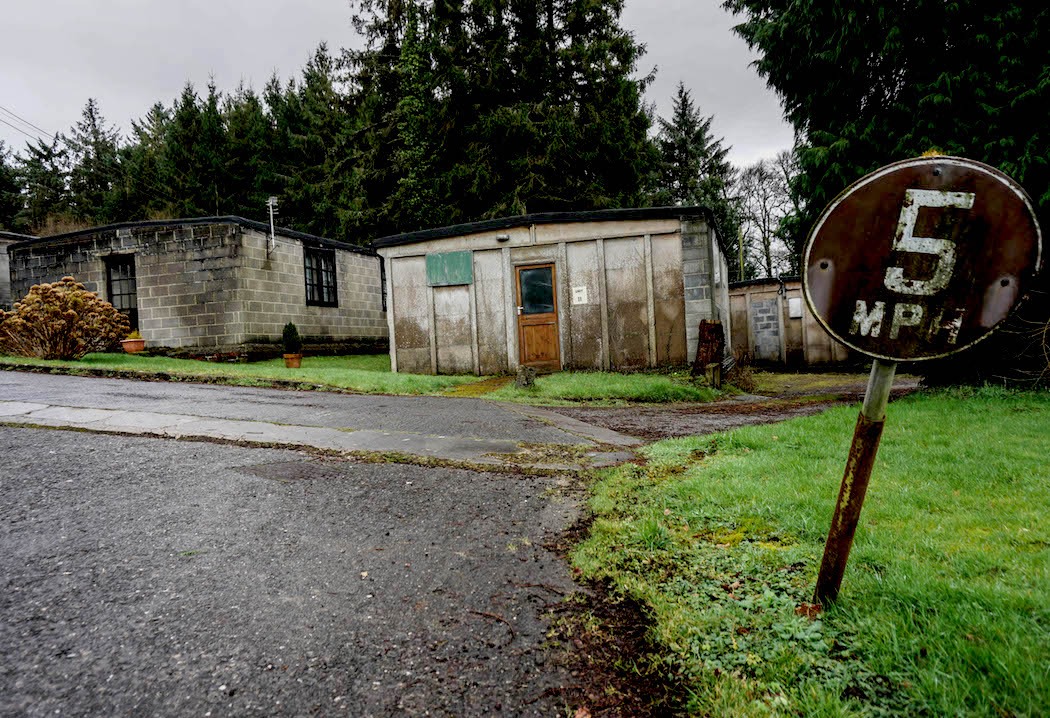 Henllan Prison Of War Camp
Henllan Prison Of War Camp
We then succeed in seeing the remains of the castle of Castellnewydd Emlyn - where apparently the last dragon in Wales - or maybe in the world? - got killed. Especially for a country with a dragon on the flag, doesn’t sound like a happy event. Anyway, Merlin, dragons…quite a lot of action going on in Sir Gâr, back in the days! Now, for us it’s just time to go back to Llandysul. Dee has work to do. It’s a nice and sunny day, and I go for a walk, but I forget to ask her for tips and directions, before leaving. I go all the way from one side of town to the other on the main road, and on the new road as well. Then I don’t really know what to do - so I just keep on going around the small park along the Teifi. It’s relaxing, anyway. I meet quite a few people walking their dogs and I later realise that every time a dog looks at me, I’ve got an automatic reflex to say “Ciao cane!” - no matter where I am. So if you saw a stranger walking in circles in the park in Llandysul and greeting dogs in Italian, it was me. But don’t worry, I’m not dangerous.
Day 4: Developing a Music Project
When I started planning this trip, in summer 2018, I made sure to keep one day free (“And you call this a vacation?” Well...yeah). You never know what might come up later. Turns out it was a very good idea, because I got to spend this day with...Dave and Pat of Datblygu, no less! I would have been very happy to hang out with them even just for the fun of it because they’re great, lovely and with plenty of sense of humour. However, in this case, I also had a mission to accomplish: going back to Italy with the only missing interview for a documentary in the making. It’s a French-Italian project, about a band from Scotland-England, another from Tennessee, one from Wales and a Germany-based label. What’s the connection among them? I will reveal more in due time- if someone’s interested. “Hey, but the interview, in Welsh or English?”. In English. Because all the documentaries I saw about bands who sing in Welsh language were...in Welsh language only, and only about Welsh bands. Nothing wrong with this, of course, and by the way, I’m looking forward to seeing Huw Stephens' music documentary Anorac on S4C Clic. However, to me, this tends to give the impression that Welsh music is like a separate world of its own- which it is not. And also, documentaries and programmes in Welsh rarely reach audiences outside the UK or people who do not speak Welsh even just a little bit already. Correct me if I’m wrong, but at least for Italy, I’m sure this is true. So why not doing something different, for once? It can do no harm, I guess.
What about Welsh language, culture and tradition?
Unfortunately, the vast majority of Italians don’t know the Welsh language even exists. Those who have accidentally heard of it usually believe it’s a dialect, or long dead. And the fact that its name, here, is so similar to Gallia and gallico certainly doesn’t help, because it naturally evokes images of an ancient past. Most people just think of Ireland, France and occasionally Scotland when Celts or any related tradition is mentioned. Just ultra-nationalistic racist parties’ and their followers, (totally unrelated) new agers and Fantasy/RPG/historical reenacments geeks often refer to them. Then folk music enthusiasts usually know at least a few Welsh artists, and rugby fans have certainly heard the national anthem. But it’s normal for anthems folk or choral music to be in old or extinct languages. I mean how can we avoid thinking of Latin, Catholic Church, canti gregoriani or ancient songs in dialects? As for literature and poetry, I suppose students of foreign languages at the University should have some degree of knowledge of it. But I still have to meet someone who knows what an Eisteddfod is. Now that I see it and hear it mentioned all the time from Welsh people, it became somewhat familiar. But until a few months ago, it was just a mysterious name in the lyrics of a song, that I had to google and- to be honest- seemed quite strange, at least for the part with the druids and bards and rituals. When it comes to modern authors, I knew Dylan Thomas because he was often mentioned along with Bob Dylan, John Lennon and the Beatles (who are some of my all time favourites). And the language? Having spent two months in Ireland (that I absolutely loved, by the way) I had heard Irish, but didn’t know it was related and I remember only one word: bruscar. And hey, it doesn’t sound like sbwriel at all!
One sure thing is that Italians tend to assume Welsh is unbelievably complicated. I must admit it doesn’t look very friendly in written form. It’s even worse, if you think the first, or only, thing we’re more likely to see is the 58-character-long name of that village in the North, that’s mentioned almost every single time Wales is mentioned. Maybe it works for tourism, but really not a very good promotion for the language. Finally, don’t forget we know nothing of the alphabet and phonetics so when we try to read it, we conclude it must sound ugly, and that’s about it. Believe it or not, I knew nothing more than the average Italian - until a few songs turned all my beliefs upside down.
Welsh music in disguise
Alright, but wait a minute. Is it possible that a music freak and record collector like me had never heard any Welsh bands before the 2000s? Of course not- it’s just that they all sang in English. And for some reason, people usually refer to minor and major celebrities from Ireland and Scotland as Irish and Scottish, but Welsh ones tend to be defined British or even - sorry again guys! - English. Except in sports.
So if you asked me to name Welsh artists, I would have only been able to say: John Cale - because I’m a Velvet Underground fan- and Tom Jones, because he just happens to always be mentioned as Welsh. I guess we all remember his comeback in the charts with the catchy 'Sex Bomb', but he must also have been very popular here in the 60s. My mom owned only a handful of singles and Tom Jones was among them. So it ended up being one of the first records I ever listened (when I found the little bag of 45s, forgotten in a closet).
I certainly knew more, but didn’t think of them as Welsh - until I had a look at a few lists around the web. Like Freur, especially for their look and hair, but I admit I also really liked “Doot Doot”. The Alarm, although I can vividly remember only their hair. Shakin’ Stevens- can anyone forget “You drive me cray-ay-zee” after hearing it even just once?. Then regulars on MTV and such like Manic Street Preachers, Catatonia, Stereophonics, Underworld and Super Furry Animals. Although picky and disdainful as I was in the 90s, only Creation label and Super Furries could kinda fit in my taste. In any case, at the time I didn’t know they also played songs in Welsh. So it took a bit longer, and more coincidences, before I actually got to hear any.
Meet Welsh-language music
The full story of how a record by a Welsh-language band ended up in my iPod is too long. So I’ll just skip to the point when, on a long drive across France, shuffle picked a song called Brechdanau Tywod: it was instantly clear that it was the kind of stuff I liked but, surprisingly, not sung in English.
“What language is this!? Oh, this is the band that Ben had mentioned. It must be Welsh, then. But these guys can’t be using an ancient language with this music...so?”
Well, turns out Welsh is a living language. And very cool sounding too. Blimey.
After a while, shuffle decided it was time for another, and more popular, song by this band: “Casserole Effeillaid”.
It seems that quite a few people in the UK heard this on John Peel on BBC Radio 1 or The Tube but we didn’t have those in Italy. Anyway. Lighter atmosphere, not dark and gloomy as the first. Also the language seemed different. It still sounded a bit weird at times - pretty much like I expected from the look of written Welsh - but I never in the world would have guessed I’d hear echoes of Italian language in it. Not jokin’! At first, this universal truth might be overshadowed by the presence of “ch”, “ll”, “dd”, “rh”, “th” and some pronunciations of the “y” - that we don’t have. But everything else sounds just like in our alphabet. Hearing this guy yelling casserole, casserole was quite hilarious by itself. But imagining possible meanings and making up sentences with the fake Italian words - like sainpassio, asgùrsio, oguèli, riòlai, esgrivenni (just to name a few not too nasty or naughty) - provided hours of extra entertainment. And the best was yet to come.
Songs had different styles, but a few were sung in a quite similar way. I don’t really know how to explain it, kinda like short sentences, very clear and distinct? It reminded me of The Fall a bit (whose lyrics, when I was a kid were just slightly more intelligible than Datblygu’s, by the way). But the Welsh words made the singer really sound like a wizard casting spells, or something: Gwahanol! Trafodaeth! Gorllewin! Gyfan gwbl ond beth meddylion nhw, pan o’n i’n hollol hollol! Awesome. Also, the little pause between verses was just perfect to try and repeat what I heard. We did something like that, in English lessons. But instead of boring things like “The red pen is on the desk” and “Good afternoon, Mrs. Freeman” now I could say…well, to tell the truth, I hadn’t the slightest idea of what I was saying. But I didn’t really care, cause it was so much fun! I was hooked for days. I would suddenly go….hollol!...any time. Hey, it’s not easy to figure out how to pronounce it right - you should know! My boyfriend probably considered leaving me in a remote corner of Brittany, not to hear any more hollols. In which case, maybe I would have ended up learning Bréton instead. But I made it back to Torino, and...what next?
But the Welsh words made the singer really sound like a wizard casting spells, or something: Gwahanol! Trafodaeth! Gorllewin! Gyfan gwbl ond beth meddylion nhw, pan o’n i’n hollol hollol!
Day 5: Voices of Welsh Language
Having no real need to speak Welsh, in the next few years I learned just tiny bits and pieces. But I kept on listening to the songs I liked, and as a consequence, no less than 90% of the Welsh language I heard came from one source only. That’s why my Voice of Welsh Language Award can only go to...David R. Edwards. The remaining 10% is split between Pat Morgan, anyone who did backing vocals on Datblygu records and a bunch of people in random videos on YouTube. Until I came across Say Something in Welsh.
When I started, last year, you had to choose North or South version right away. I didn’t have a clue of what it meant. The only sure thing was that I liked the Aberteifi version of the language. Aberteifi is in the South. Then South version was the way to go. And that’s how Iestyn and Cat became Mr. and Mrs. Number Two Voice(s) of Welsh. Both, because in the course they say the same phrases - apart from a few sentences he occasionally adds in the introduction to the Challenges - but I’m sure he doesn’t mind sharing the title.
SSiW South - Live in person
Cat and Iestyn happen to live in Llandysul, too and on Monday morning Dee has organized a meeting with him at Buon Appetito (!) cafe. There’s photos of Valentino Rossi and Ducati bikes all over the place so, sipping a good cappuccino, it’s almost like being already back to Italy. Almost. Because rumors are that Mister Voice Number Two has no mercy and only Welsh is allowed in his presence. Like the recorded version of himself, and Aran, he expects learners to just speak as much as possible and make a lot of mistakes - ‘cause that’s the fastest way to learn. What I didn’t know is that when we meet, he automatically switches to speaking-to-learner mode: extra slow speed and articulating syllables very clearly. Oooh, he’s the first person to do this for me! It seems a good moment to use mae gyda fe galon mor garedig…isn’t it? We’re all aware people don’t speak like this, in real life. But it definitely helps in the following conversation, that’s mostly around the experience of learning languages. Oh well, not surprised - with two SSiW staff members, how could we not talk about it? But with a lot of laughs too - because they’re mandatory in SSiW philosophy and teachings.
Day 6, Epilogue: A final exam (sort of)
Next day, Tuesday, early in the morning, I have to say goodbye to Dee and walk to the bus stop. Same route as the first day, backwards: Bwcabus to Pencader, then Carmarthen, London and Stansted. I have time for one more coffi, before leaving Wales, as long as it’s not too far from the bus station. Luckily Dee knew a place called Pantri Blakeman, that’s right in front. She had been there with a group of students from Quebec, and the staff was very nice. Great to know, ‘cause this is my last chance to speak Welsh in the wild for this trip and I have to do my best. I have a look at the menu. There’s a lot of traditional dishes. Now I can’t help but thinking that I have to leave soon...dammit...I guess some comfort food is what I need. Like that pwdin reis I see in the refrigerator. The very friendly lady who comes to take the order is happy to siarad Cymraeg. It’s a very quiet hour, she’s not too busy and we can chat a bit. She speaks clearly and even helps me find the words I can’t remember - definitely recommended for learners who want to practice! She still remembers the group of Canadians who sang Calon Lân, and is curious to hear why an Italian decided to study this language. A girl from Ireland who works there is a Welsh learner, and seems even more curious to hear how I’m learning it. From what they say, I’m doing quite well for someone who’s never been in a Welsh language course classroom and only spent just a few days in Wales in all her life. I guess I can consider myself proficient enough for restaurants and pubs chatting.
Cymhwyster Tŷ Bwyta, passed. But now I see the bus from the window, and I shouldn’t miss it, I’m afraid.
The English teacher
The time it took me to get back to Torino would have been enough to reach Australia. Next time I’m definitely willing to spend a bit more and fly to Cardiff. A few flights landed at the same time and there’s a pretty long queue also for EU citizens (not that it can make a difference, but I have to say it: Italians are the only true masters of chaos. Please, stop imitating us, straighten things up and...stay!)
The lady next to me and I start talking, while we wait. She’s an English English teacher. I mean, she’s from England and teaches English, in Italy.
“How good are Italians at English?” - I ask.
“Oh they know grammar really well, but they can’t speak.”
Nothing changed, since I finished school, then. And from what the ex-students I met in Wales said, learning Welsh as a second language at school is not different. Something doesn’t work too well in the way languages are taught in school?
In my case, it’s only because I loved songs in English a lot that I didn’t end up hating the language, and went on learning it the way I enjoyed: from records, books, films, magazines, fanzines, Internet...and most of all, people. Luckily now with Welsh I can avoid the boring and annoying parts, and just keep the good ones.
Now I think about it, and finished writing this, I’d better start organising next trip to Wales right away. Hwyl am y tro!

